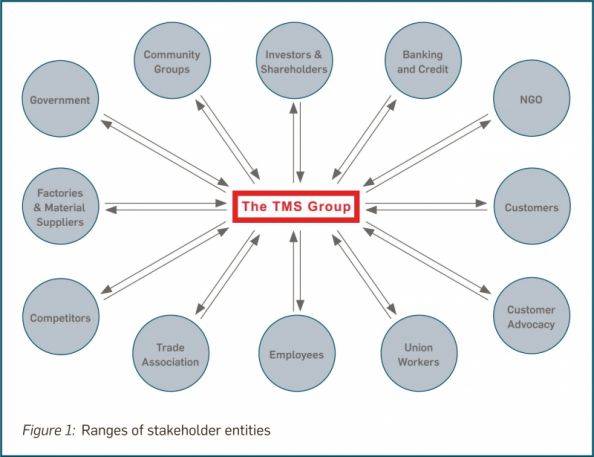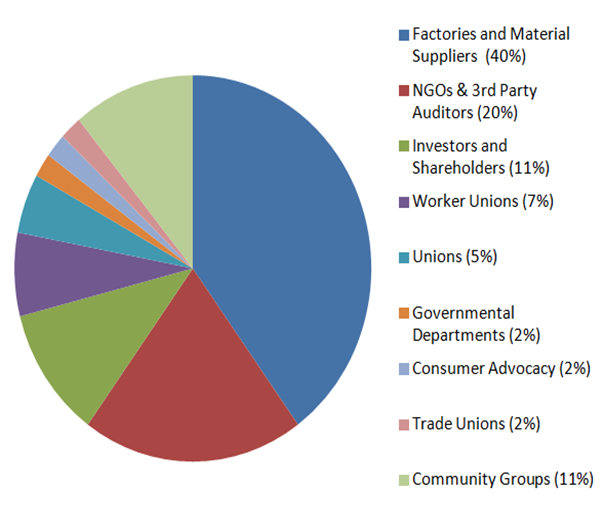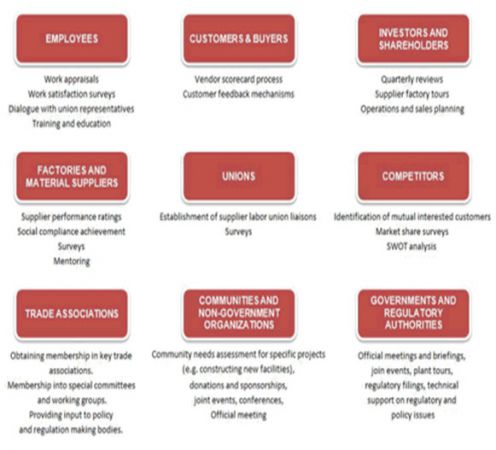Cambodia and Vietnam: Linking Stakeholder Engagement to Corporate Social Responsibility Programs
For nearly three decades, the TMS Group has been at the forefront of the fashion industry as a globally-based fashion and apparel innovator, with core competencies in research and development, product design, fashion-trend analysis, and production sourcing / quality management. With operational offices in seven countries, the TMS Group customer-base spans every continent.
In alignment with Mission and Vision Statements, in the first quarter of 2013, the TMS Group expanded its global presence and operations with the opening of the regional office in Phnom Penh, Cambodia. With a foothold in Cambodia, the operations for both Cambodia and Vietnam can be managed.
As an international fashion and service-providing trading company, the TMS Group recognizes its corporate citizenship responsibility toward society and the global environment at large. For more than a decade, sustainability and ethical sourcing have been integral parts of the TMS Group’s business strategy, shaping policies and procedures that extend throughout the supply chain.
CSR as a dynamic business element
It was paramount to incorporate all aspects of a framework for corporate social responsibility (CSR) into business development plans for Cambodia and Vietnam. This aspect began during the concept and feasibility phases and extended through to the operational startup phase. This also included major tactical (daily) and strategic (long-term) planning and execution.
This approach also takes into consideration two fundamental characteristics of CSR that are highly relevant for creating and executing a stakeholder engagement process geared toward CSR program design, continuous improvement, and business development.
The first consideration is viewing CSR as a process rather than a specific set of outcomes or measurable events. CSR cannot be a static architecture because the world of business and society are both dynamic entities. As the relationships between the various business entities change, and as the global environment changes, the responsibilities of businesses change as well. Moreover, CSR becomes analogous to monitoring the global societal and economic environment and the impacted relationships. CSR is not a fixed mission statement with respect to specific groups, nor does it have a predetermined set of fixed objectives.
The second consideration is that CSR as a practical matter is extremely vulnerable to changes within specific country environments, organizational structures (in multiple countries of operation), and even in the power that is leveraged by CEOs and other board-level executives. Consequently, these traits make CSR a complex entity that is difficult to define for every organization. In other words, CSR is a long-term, evolving entity that is largely defined by moral and ethical standards, and never constrained by the limits of written laws.

Stakeholder identification
Understanding and identifying (current and potential) stakeholder contributions, desires, and rationales with respect to CSR was a key component in establishing the working CSR doctrine and framework that was extended to Cambodia and Vietnam.
This framework is also aligned with strategic and business objectives and is consistent with the TMS Group’s core values. Furthermore, the framework is unique, in that it resides within the realm of moral obligations, or a “higher authority” of standardized principles, going beyond adherence to the respective international and local laws.
Involving stakeholders in decision-making processes is not confined to CSR development. This methodology is a tool used by private and public organizations to develop a thorough understanding and mutual agreements to solutions on complex issues or matters of broad concern. The TMS Group employs this process internally for similarly related issues to include strategy development.
The concept of stakeholder engagement is part of the continuous dialogue for stakeholder inclusion in the development of the TMS regions of Cambodia and Vietnam. This was done with the understanding that there is no one-size-fits-all with respect to CSR. Furthermore, it was of supreme importance to identify all major stakeholders within the sphere of influence. The late English poet John Donne wrote “No man is an island,” and hence the same is true for the TMS Group or any corporation. There is a natural connection between the idea of CSR and an organization’s stakeholders. The TMS Group has affirmed that the concept of stakeholders personalizes the social responsibilities for a company. This is achieved by clearly defining the specific groups and individuals that the TMS Group must consider in its CSR orientation, namely new countries and new players.
Figure 1 sets forth 12 major and comprehensive stakeholder categories that were identified as key elements to both CSR and business development processes. Similarly, Figure 2 outlines in greater detail the constituency of the core stakeholder groups. Of noteworthy consideration, production suppliers comprised nearly 40 percent of stakeholder participants. However, total membership spans nine separate and distinct business and operational categories. As a result, a healthy balance is maintained.

Methods of stakeholder engagement and feedback
There is a wide range of methods for engaging with different stakeholder groups, and this varies within the operational / country regions, too. For example, one method that TMS uses to communicate with suppliers and the local communities – in both existing and new regions of sourcing – includes our CSR social compliance self-evaluation process. This is the process in which suppliers identify their CSR and business strengths, weaknesses, and key opportunities to boost their CSR certifications. In order to be successful, the process requires openness and transparency from stakeholders. Figure 3 outlines a sampling of stakeholder engagement methods for TMS, and in particular the key elements that are effective for the Cambodia and Vietnam regions. They represent part of a dynamic and ongoing plan of action.
It is also important to note that there are significant differences between suppliers, businesses, and their stakeholders. This is evident even within individual stakeholder groups. This process of stakeholder engagement is further complicated when dealing with two separate countries such as Cambodia and Vietnam. Despite being neighboring countries, each is different with respect to cultural norms, demographics, and governmental and socioeconomic conditions. Even within each country’s regional business landscape, a wide range of views and inputs are present within stakeholder groups.

Utilizing guiding principles
In order to create effective stakeholder engagement, a set of six Guiding Principles were identified and used to galvanize the process. These principles are closely linked to our core values and corporate culture.
Principle 1: Identify and know your stakeholders
Get to know all stakeholders, even on the most basic level. The garment industry is one in which different suppliers may be making similar or identical products; methods of engagement required might be completely different. Developing a comprehensive understanding of our stakeholders in the two countries was paramount in shaping CSR, its links to business objectives, and in creating specific regional initiatives.
Principle 2: Initiate the process as early as possible and develop a sustainable implementation plan
Involving stakeholders as early as possible in decision-making processes will significantly enhance the mutual understanding of all involved parties. The early inclusion of stakeholders may increase the duration of the specific process, which we experienced with both internal and external stakeholders. However, stakeholders will generally smooth out the process of enhanced cooperation between all participants, leading to more acceptable and robust decisions.
Including stakeholders in the decision-making process during the early stages of our launch into Cambodia and Vietnam provided an opportunity to forge a sustainable CSR plan, not only in terms of philosophy, but also in terms of scope, objectives, and effectiveness.
Principle 3: Reactive and open
Regardless of the circumstances, a “reactive and open” approach is needed. Engagement is a two-way process that respects the input of the stakeholders and allows for mutual learning by both parties. Stakeholder contributions benefit the performance of CSR, the business objectives of TMS, as well as the new regions.
Principle 4: Be inclusive
It is critical to be inclusive in stakeholder engagement. This would include suppliers or other groups that may have had poor performance records, used confrontational approaches, or even had limited communication capabilities for such endeavors – such as businesses that lack employees with English or local language skills. This is particularly true in Cambodia, where many factories of foreign investors have been transplanted from mainland China. Inclusiveness implies that engagement is critical, regardless of business performance or the extra effort required to obtain stakeholder participation.
The process should include all the relevant stakeholders. It should extend representation beyond the obvious candidates to all those perceived to have a share in – or an impact on – the endeavor. Diverse levels of expertise and experience augment the process and lend a higher level of validity to any results.
Principle 5: Transparent and trusting
Transparency and trust are interrelated and constitute the building blocks of a successful stakeholder engagement process. They are the basis for understanding, generating confidence in the process and promoting a positive outcome. They are fostered by mutually agreed-upon rules and mechanisms. With respect to our TMS Group CSR program, this is particularly important, since suppliers are often asked to provide access to certain sensitive aspects about their financial and production performance.
Stakeholder engagement – continuous improvement
As a fundamental matter, many CSR professionals and academics would agree that CSR does not have a universally accepted paradigm. Hence, through the stakeholder identification and engagement process, the essential elements of CSR for the TMS Group were identified, reaffirmed, and leveraged in developing the Cambodia and Vietnam frameworks. This was extended for the implementation and future alignment checks for goals and objectives. This approach to stakeholder engagement was taken with the clear understanding that the basic elements of CSR and stakeholders are linked together. Approaching stakeholder engagement as a living and breathing entity will ensure its successful implementation.
| Initiator | TMS Group |
| Project start | 2013 |
| Status | ongoing |
| Region | Vietnam, Cambodia |
| Contact person | Jeffrey Revels |
| Awards | - |
| Anti-Corruption | - |
| Business & Peace | - |
| Development | - |
| Environment | - |
| Financial Markets | - |
| Implementing UNGC Principles in your Corporate CSR Management | x |
| Human Rights | - |
| Labour Standards | x |
| Local Networks | - |
| Advocacy of global issues | - |
| Business opportunities in low income communities/countries | - |
| Project funding | x |
| Provision of goods | - |
| Provision of services/personal | x |
| Standards and guidelines development | x |
Mr Revels is the Global Compliance Manager for the TMS Group, and has been based in Indonesia for more than 10 years.
TMS is a chinese fashion producer and reteiler. They run stores and factories in China, Indonesia, India, Bangladesh, Vietnam and Cambodia.
Write a comment about this page
Your comments are provided by your own free will and you take sole responsibility for any direct or indirect liability. In order to maintain the highest discussion quality, all comments will be reviewed by our editors. You hereby provide us with an irrevocable, unlimited, and global license for no consideration to use, reuse, delete or publish comments in accordance with our Community Guidelines.
About Us // Privacy Policy // Copyright Information // Legal Disclaimer // Contact
Copyright © 2012-2018 macondo publishing GmbH. All rights reserved.
The CSR Academy is an independent learning platform of the macondo publishing group.








